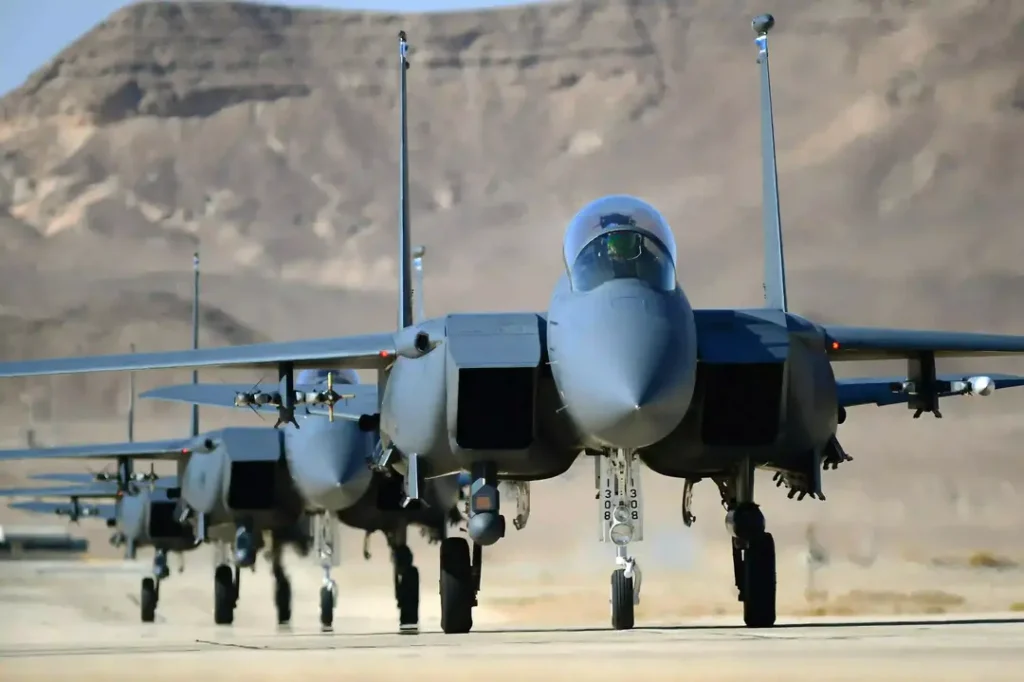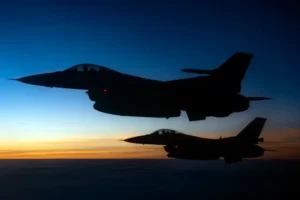Israel has pivoted towards increasingly aggressive tactics in Syria, unleashing more potent strikes on Iran-associated targets within Syria’s volatile landscape.

Israel has initiated a series of intense strikes within Syria, targeting cargo convoys, crucial infrastructure, and individuals connected to Iran’s supply chain to regional proxies, according to multiple sources familiar with the situation who spoke to Reuters.
Six sources, including a Syrian military intelligence official and a commander within the regional alliance supporting Damascus, detailed a shift in Israel’s strategies after Hamas incursions into Israeli territory on October 7, followed by subsequent Israeli retaliatory actions in Gaza and Lebanon.
While Israel has historically targeted Iran-related sites in Syria, particularly in regions where Hezbollah, the Lebanese armed group, operates, the nature of these strikes has evolved. The sources revealed a marked increase in the frequency and intensity of Israeli air raids, specifically aimed at disrupting Iranian arms transfers and air defense systems in Syria.
A commander within the regional alliance and additional sources familiar with Hezbollah’s operations stated that Israel has forsaken previously tacit “rules of engagement.” They noted a departure from the prior approach characterized by warning shots—where strikes were aimed near the target to prompt individuals to vacate the area—towards a more direct and lethal approach. The new strategy involves targeting and eliminating targets outright, abandoning the former caution in inflicting significant casualties on Hezbollah in Syria.
This escalated air campaign has resulted in the deaths of 19 Hezbollah members in Syria over three months—a figure exceeding twice the total casualties of 2023 combined, according to a tally by Reuters. Additionally, more than 130 Hezbollah fighters have been killed by Israeli shelling in southern Lebanon during the same period.
Israeli military representatives declined to respond to inquiries about the escalating offensive. However, an anonymous senior Israeli official, briefing journalists, asserted that Hezbollah initiated this round of conflict through attacks on October 8, positioning Israel’s strategy as retaliatory.
Addressing reports of an Israeli strike in Syria last month, Israel’s military chief emphasized their forces’ active presence throughout the region and the commitment to take necessary actions to safeguard Israel’s security.
Previously, sources suggested Israel refrained from targeting Hezbollah members due to fears that high casualties would prompt retaliatory actions against Israeli settlements near the border in Lebanon.
However, with daily exchanges of fire following the October 7 incident, Israel appears more willing to take aggressive actions against Lebanese Hezbollah in Syria without exercising previous caution, as observed by a regional intelligence officer.
In a televised statement on January 5, Hezbollah leader Sayyed Hassan Nasrallah acknowledged the loss of several fighters in Israeli attacks in Syria over the past three months. Nasrallah highlighted a shift in the operational landscape due to the ongoing conflicts across multiple fronts.
Nasrallah referenced a change in the previous modus operandi, stating, “We had a formula before the Aqsa Flood operation—if they killed any of our brothers in Syria, we would respond on the Lebanon front, which was calm. Practically, this formula’s conditions have changed—why? Because the whole front is lit up now.”
He highlighted specific incidents, such as an Israeli drone strike in December that killed three Hezbollah fighters planning potential operations in northern Israel. Another strike in Quneitra targeted two Hezbollah members responsible for weapons transfers, as disclosed by a commander in the pro-Syrian alliance.
Further, additional strikes in late December targeted buildings and trucks used by Iran-aligned militia groups along Syria’s eastern border with Iraq, resulting in the deaths of four more individuals.
These strikes have also claimed the lives of Iranian Revolutionary Guards in Syria. Notably, a senior advisor overseeing military coordination between Syria and Iran was killed in a strike on December 25, indicating a shift in Israel’s operational approach post-October 7, according to sources knowledgeable about Hezbollah’s operations in Syria.
Beyond targeting individuals, infrastructure in southern Syria has also been affected. An air defense base was struck on December 28, following an earlier attack on an anti-aircraft defense system.
Sources within Syrian intelligence reported that these strikes frequently target defensive equipment before their installation. Moreover, critical airports in Damascus and northern Aleppo—facilities used by Iran for arms transfers—have suffered significant disruptions due to continual strikes.
A regional intelligence source contextualized these strikes as a message from Israel to Syrian President Bashar al-Assad. The strikes signify Israeli discontent with the transfer of weapons and the increasing Iranian and Hezbollah presence within Syria, putting Assad in a precarious position.
Despite the intensification of strikes, the Syrian military, which heavily relied on Hezbollah and Iran during its civil war against rebels, has refrained from opening its own front against Israel. A Syrian intelligence official stated their reluctance to engage in direct confrontation or open warfare with Israel.
Allegations surfaced suggesting that Assad received warnings from Israel discouraging any support for Hamas after the October 7 incident. Sources claim these warnings were conveyed through the United Arab Emirates. However, the UAE dismissed these assertions as “baseless and unfounded,” with no response from Syria’s information ministry regarding these allegations.
A source knowledgeable about Hezbollah’s standpoint noted the seriousness with which the group perceived these threats, realizing the potential risks to their established presence in Syria.







